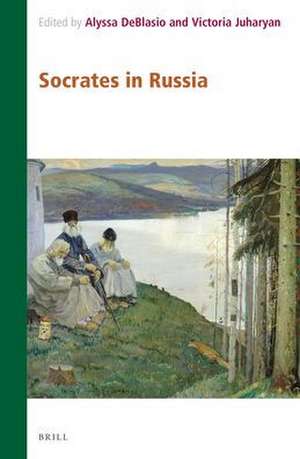Socrates in Russia: Contemporary Russian Philosophy, cartea 5
Alyssa DeBlasio, Victoria Juharyanen Limba Engleză Hardback – 4 oct 2022
Preț: 733.81 lei
Preț vechi: 894.89 lei
-18% Nou
Puncte Express: 1101
Preț estimativ în valută:
140.42€ • 146.79$ • 118.67£
140.42€ • 146.79$ • 118.67£
Carte indisponibilă temporar
Doresc să fiu notificat când acest titlu va fi disponibil:
Se trimite...
Preluare comenzi: 021 569.72.76
Specificații
ISBN-13: 9789004523319
ISBN-10: 9004523316
Pagini: 366
Dimensiuni: 155 x 235 mm
Greutate: 0 kg
Editura: Brill
Colecția Brill
Seria Contemporary Russian Philosophy
ISBN-10: 9004523316
Pagini: 366
Dimensiuni: 155 x 235 mm
Greutate: 0 kg
Editura: Brill
Colecția Brill
Seria Contemporary Russian Philosophy
Notă biografică
Alyssa DeBlasio is John B. Parsons Chair in the Liberal Arts and Sciences and Associate Professor of Russian at Dickinson College. She is the author of two monographs: The End of Russian Philosophy (Palgrave Macmillan, 2014) and The Filmmaker’s Philosopher: Merab Mamardashvili and Russian Cinema (Edinburgh University Press, 2019). Together with Mikhail Epstein, she edits Filosofia: An Encyclopedia of Russian Thought, an online English-language resource dedicated to contemporary Russian philosophy.
Victoria Juharyan is a Visiting Assistant Professor and Undergraduate Advisor in the Department of German and Russian at UC Davis. She received her PhD from the Department of Slavic Languages and Literatures at Princeton in 2018. In addition to revising her dissertation, “The Cognitive Value of Love in Tolstoy: A Study in Aesthetics,” she is also completing her book manuscript, German Idealism and Russian Realism: Hegel’s Philosophy in Goncharov, Turgenyev, Tolstoy, and Dostoevsky.
Victoria Juharyan is a Visiting Assistant Professor and Undergraduate Advisor in the Department of German and Russian at UC Davis. She received her PhD from the Department of Slavic Languages and Literatures at Princeton in 2018. In addition to revising her dissertation, “The Cognitive Value of Love in Tolstoy: A Study in Aesthetics,” she is also completing her book manuscript, German Idealism and Russian Realism: Hegel’s Philosophy in Goncharov, Turgenyev, Tolstoy, and Dostoevsky.
Recenzii
"“Α hero, a genius, and a saint”: That is how Socrates appeared to one of his many Russian followers—moralists, philosophers, poets, novelists, essayists, and dramatists. Though Socrates was incorporated in the culture of Rus’ as early as the 10th century, this volume focuses on his immense influence on Russia and the Soviet Union since the 18th century, when Gregory Skovoroda, who became known as “the Ukrainian (or Russian) Socrates,” engaged in a lifelong pursuit of that most elusive figure, whom he saw as a model on whom a genuinely Russian philosophical tradition could be based. This fascinating volume documents the immense—but, to the West, little-known—influence of Socrates on an impressively large and talented coterie of Russian and Soviet intellectuals, which includes Pushkin, Dostoevsky, and Tolstoy. It also gives a powerful illustration of the adaptability of Socrates, especially as we know him through Plato’s dialogues, to different moral, philosophical, literary, and even national, contexts." - Alexander Nehamas, Edmund N. Carpenter II Class of 1943 Professor in the Humanities, Philosophy and Comparative Literature at Princeton University
Cuprins
Contents
Foreword
Acknowledgements
Notes on Contributors
Introduction
Alyssa DeBlasio and Victoria Juharyan
1 Socrates in the Philosophy and Intellectual Culture of the Russian Enlightenment
Tatiana Artemyeva
2 The Poet Hryhory Skovoroda: Knowledge as a Process
Erica Camisa Morale
3 Elenchus from Other Shores: Alexander Herzen’s Dialogue in Absentia
Arpi Movsesian
4 Writing the Russian Socrates: Dostoevsky, Skovoroda, and the World of The Brothers Karamazov
Brian Armstrong
5 A Symposium with Vasily Rozanov
Irina Erman
6 Anti-Socratic Attitudes in Russian “Nietzscheanism”
Andrea Oppo
7 Gustav Shpet and the Greek Renaissance of Russian Thought
Liisa Bourgeot
8 “Skovoroda’s Way” in the Russian Symbolist and Post-Symbolist Tradition
Vadim Besprozvany
9 Between a Satyr and an Eccentric: Nikolai Bugaev as a Russian Socrates in Andrei Bely’s Works
Daria Solodkaia
10 Conversations with Socrates: The Image of Socrates in Russian and Soviet Philosophical Literature
Olga Lyanda-Geller
11 The Fear of the Word: Socratic Subtext in the Yershalaim Chapters of Mikhail Bulgakov’s Master and Margarita
Ksenia Radchenko
12 Maieutics for Socialist Children: Nikolai Nosov’s Neznaika and the Epistemology of Know-Nothingness
Denis Saltykov
13 Socrates as Symbol: Alexander Herzen, Merab Mamardashvili, and Alexander Pushkin
Alyssa DeBlasio
14 Socrates the Greek Teacher
Leo Tolstoy and Aleksandra Kalmykova
15 Grigory S. Skovoroda
Leo Tolstoy
16 All-Divergence: The Teachings of Iakov Abramov as Interpreted by His Disciples
Mikhail Epstein
Index
Foreword
Acknowledgements
Notes on Contributors
Introduction
Alyssa DeBlasio and Victoria Juharyan
1 Socrates in the Philosophy and Intellectual Culture of the Russian Enlightenment
Tatiana Artemyeva
2 The Poet Hryhory Skovoroda: Knowledge as a Process
Erica Camisa Morale
3 Elenchus from Other Shores: Alexander Herzen’s Dialogue in Absentia
Arpi Movsesian
4 Writing the Russian Socrates: Dostoevsky, Skovoroda, and the World of The Brothers Karamazov
Brian Armstrong
5 A Symposium with Vasily Rozanov
Irina Erman
6 Anti-Socratic Attitudes in Russian “Nietzscheanism”
Andrea Oppo
7 Gustav Shpet and the Greek Renaissance of Russian Thought
Liisa Bourgeot
8 “Skovoroda’s Way” in the Russian Symbolist and Post-Symbolist Tradition
Vadim Besprozvany
9 Between a Satyr and an Eccentric: Nikolai Bugaev as a Russian Socrates in Andrei Bely’s Works
Daria Solodkaia
10 Conversations with Socrates: The Image of Socrates in Russian and Soviet Philosophical Literature
Olga Lyanda-Geller
11 The Fear of the Word: Socratic Subtext in the Yershalaim Chapters of Mikhail Bulgakov’s Master and Margarita
Ksenia Radchenko
12 Maieutics for Socialist Children: Nikolai Nosov’s Neznaika and the Epistemology of Know-Nothingness
Denis Saltykov
13 Socrates as Symbol: Alexander Herzen, Merab Mamardashvili, and Alexander Pushkin
Alyssa DeBlasio
14 Socrates the Greek Teacher
Leo Tolstoy and Aleksandra Kalmykova
15 Grigory S. Skovoroda
Leo Tolstoy
16 All-Divergence: The Teachings of Iakov Abramov as Interpreted by His Disciples
Mikhail Epstein
Index




